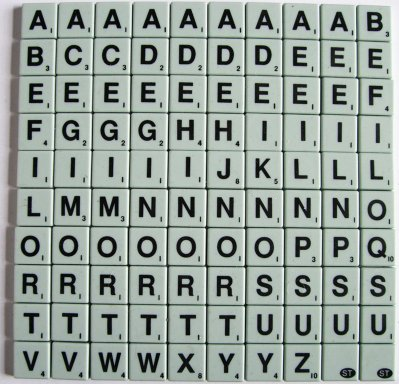
This week, we got another great example of how science stories are often misinterpreted by the media. Articles in the Calgary Herald, Global News, and MSNBC all touted a new Canadian study which they say shows that ‘Scrabble makes you smarter.’ If this sounds too good to be true, that’s because it is. (To their credit, the folks at CBC appear to have done their homework.) However, the study’s real conclusion is no less interesting: it provides further evidence that the human brain can re-wire itself even into late adulthood.
The first step in getting past media hype is to look at the peer-reviewed article itself. (Happily, the good folks at Memory and Cognition have been kind enough to make this particular work open access, thanks guys!) From the abstract:
The results of a series of cognitive assessments showed that the Scrabble players and control participants differed only in Scrabble-specific skills.
In other words, being good at Scrabble doesn’t actually make you smarter, just better at Scrabble. This may sound pretty elementary, but as you might guess, it wasn’t really the point of the study. “We’re in the business of studying language and word recognition,” says Penny Pexman, professor of Psychology at the University of Calgary and Director of the Language Processing Lab. “Are all adults walking around with the same system for word recognition, or is it shaped by experience?”
Prevailing theory is that our ability to recognize words like ‘house’ or ‘tree’ from non-words like ‘prane’ or ‘nang’ is based on three factors: spelling (orthography), sound (phonology) and meaning (semantics). “When you’re a kid, you’re probably sounding out everything. That becomes a little bit less important as you become a literate adult, but there’s very good evidence that you’re still thinking about sound,” says Pexman. Neither sound nor spelling is as important as meaning, however. Pexman says that there’s good evidence to show that concrete words for which a mental image jumps easily to mind (‘truck’ or ‘leopard’) are generally recognized more quickly than abstract ones (‘happiness’ or ‘truth’). English words are also easier to recognize when presented horizontally than vertically, since that’s how we normally read.
The team compared three groups of people for their ability to recognize words, or as she puts it, “complete the lexical decision task (LDT).” One group was the typical sample of university undergrads that participate in most psychology studies, to be used as a baseline. Another was a group of elite Scrabble players; people who play at least once a week and have dedicated significant time to memorizing the 180,000 word Scrabble dictionary. Lastly, because the Scrabble experts were a bit older than university undergrads, the team put together an age-matched control group of non-experts.
The results are not particularly surprising: younger people are really good at the LDT and can usually identify a word in about 500 milliseconds. Older people slow down to about 850 milliseconds on average. But those who play a lot of Scrabble can get down to about 700 or 650 milliseconds. They’re also better at identifying words when written vertically than non-Scrabble players.
Exactly how they do this may be revealed by another effect that the team noted: expert Scrabble players showed a smaller concreteness effect, that is, they weren’t slowed down by abstract words as much as the control group. “In the Scrabble experts, we see this relative de-emphasis of meaning information,” says Pexman. “They’re doing this quite differently than the classic models of word recognition would have predicted. They have essentially altered their systems as a function of their experience.”
Thus, we get to the real finding; by practicing Scrabble obsessively, the elite players have actually re-wired their brains, which now function differently from those who are not Scrabble experts. Significantly, they have done this late in life, which challenges the theory that adults brains are less elastic than youthful ones.
The brain’s proven ability to re-wire itself through practice is great news for anyone whose brain isn’t working as they would like it to, from brain injury patients to those battling senility and dementia. True, playing Scrabble won’t make you smarter overall, and neither will any other narrowly defined mental task (makers of BrainGym, take note!) Instead, mental fitness is like physical fitness; not everyone will be an Olympic athlete, but with enough training and practice, we can get better at almost any task, no matter how old we are.
No comment yet, add your voice below!